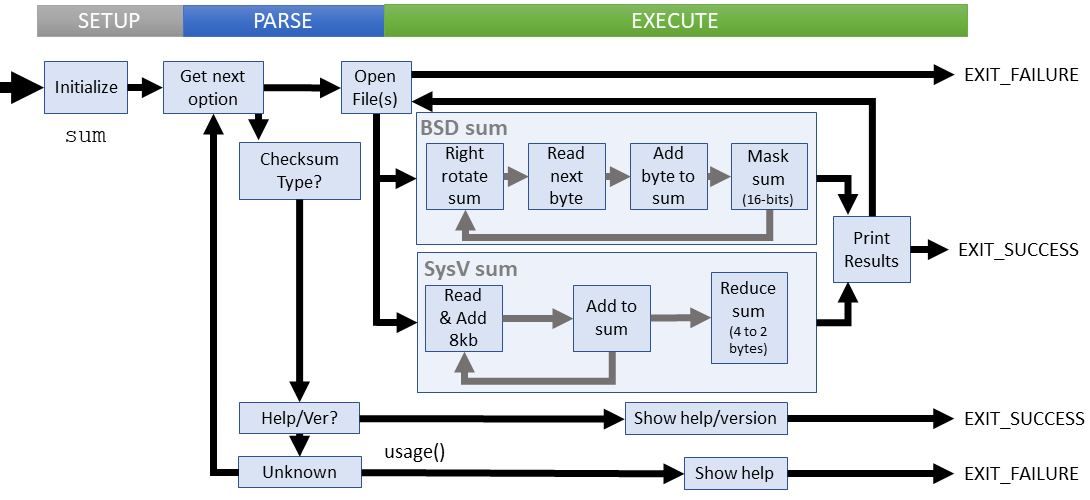[GNU Manual] [No POSIX requirement] [Linux man] [FreeBSD man]

Summary
sum - print checksum and block counts
Lines of code: 274
Principal syscall: write() via printf()
Support syscalls: None
Options: 5 (2 short, 3 long)
Descended from V3 UNIX (1973) through System V sum -r (1983) and 4.3BSD sum (1986)
Added to Textutils in November 1992 [First version]
Number of revisions: 120 [Code Evolution]
The sum utility is deprecated in favor of the standardized cksum utility which exhibits better cryptographic properties. sum is maintained for compatibility with scripts for legacy BSD and System V machines
Helpers:bsd_sum_file()- BSD checksum operation (1K blocks)sysv_sum_file()- SysV checksum operation (512-byte blocks)
die()- Exit with mandatory non-zero error and message to stderrerror()- Outputs error message to standard error with possible process terminationhuman_readable()- Applies a well-known basis to a raw integersafe_read()- Reads with retry on interrupt
Setup
The sum utility performs limited setup in main(), declaring the following local variables:
files_given- The number of files to checkok- The utility return statusoptc- The next command line option to parsesum_func- Function pointer for the sum function to use (BSD or SysV)
Parsing
Parsing sum only checks for two options beyond the default help and version. Both switces are used to select the sum function, either the BSD or SysV compatible variants.
Parsing failures
Parsing may fail if the user provides an unknown option. The result is a short error message followed by the usage instructions.
Execution
Execution is simple: Loop through each input file (or stdin), compute the sum and count the block size. Print the results.
To make this more interesting, let's tear apart the two checkcum functions.
BSD sum
The BSD checksum adds together the 'value' of all the bytes while right rotating the bits between add operations:
while ((ch = getc (fp)) != EOF)
{
total_bytes++;
checksum = (checksum >> 1) + ((checksum & 1) << 15);
checksum += ch;
checksum &= 0xffff;
}
- First, we're counting the bytes read as
total_bytes. - Next we rotate the bits right by shifting all bits right and masking the LSB to the MSB position
- Add the new character to the sum
- Mask the lower 16-bits to keep a valid range
System V sum
The System V checksum also relies on adding bytes, but without the bit rotation. The following snippet has been edited for length (original source)
while (1)
{
size_t bytes_read = safe_read (fd, buf, sizeof buf);
for (size_t i = 0; i < bytes_read; i++)
s += buf[i];
total_bytes += bytes_read;
}
r = (s & 0xffff) + ((s & 0xffffffff) >> 16);
checksum = (r & 0xffff) + (r >> 16);
- We read in a block of 8192 bytes (sizeof buf) in to
buf. - Then look through the buffer adding the intermediate values to
s - Track the number of bytes read as
total_bytes - Finally, we reduce the final checksum from 4 bytes to 2 bytes in 2 steps
- Add the high-order to the low-order bytes. Expect some 'overflow' in to the high order result
- Repeat it again, this time without possible overflow, leaving a 16-bit result
For a more advanced checksum, refer to the cksum utility
Failure case:
- Unable to open, read, or close an input file